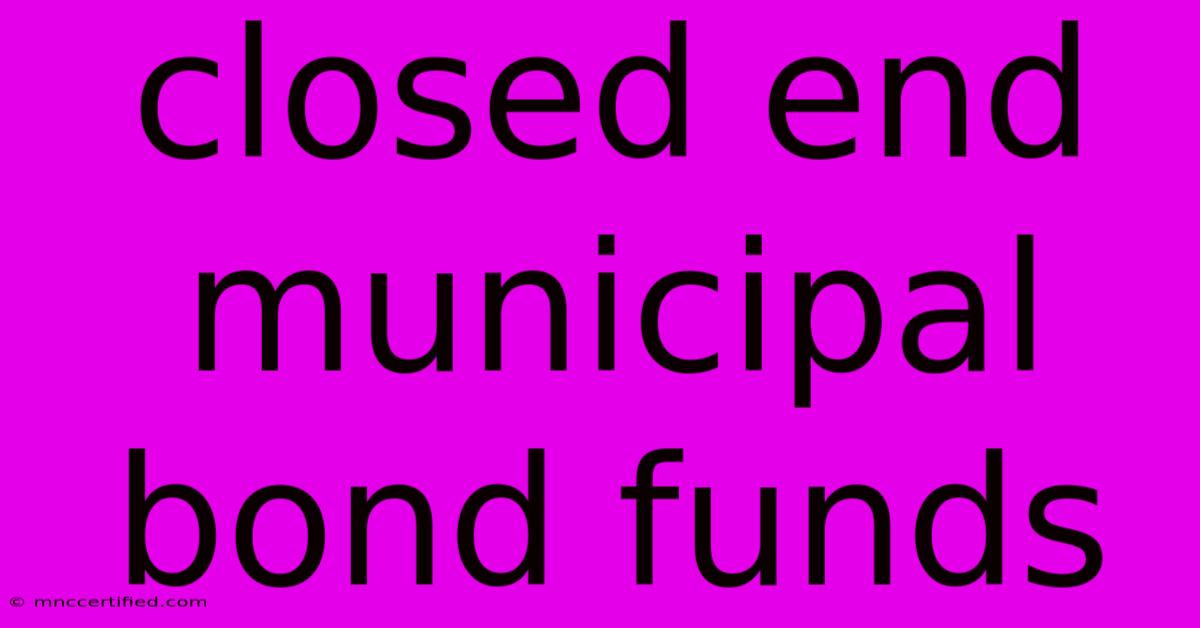Closed End Municipal Bond Funds

Table of Contents
Closed-End Municipal Bond Funds: A Deep Dive for Investors
Closed-end municipal bond funds offer a compelling investment opportunity for those seeking tax-advantaged income. But understanding their nuances is crucial before diving in. This comprehensive guide will explore everything you need to know about these funds, helping you determine if they're right for your portfolio.
What are Closed-End Municipal Bond Funds?
Closed-end municipal bond funds are investment companies that pool money from multiple investors to purchase municipal bonds. Unlike open-end funds (mutual funds), they issue a fixed number of shares that are traded on stock exchanges like stocks. This means their share price fluctuates throughout the day, influenced by market demand and supply, and isn't directly tied to the net asset value (NAV) of the underlying bonds.
Key Differences from Open-End Funds:
- Fixed Number of Shares: Closed-end funds have a set number of shares, unlike open-end funds which continuously issue and redeem shares.
- Trading on Exchanges: Shares are bought and sold on exchanges throughout the trading day, influencing price volatility.
- Price Fluctuation: The share price can trade at a premium or discount to the NAV.
- Potential for Capital Appreciation/Losses: In addition to income from bond interest, investors can experience capital gains or losses depending on share price changes.
Understanding the Appeal of Closed-End Municipal Bond Funds
These funds offer several attractive features for income-seeking investors:
- Tax Advantages: Interest income from municipal bonds is generally exempt from federal income tax. This makes them especially attractive for high-income earners in higher tax brackets. (Note: State and local taxes may apply depending on the issuer of the bonds and your residency.)
- Diversification: Investing in a fund allows diversification across various municipal issuers and bond maturities, reducing individual bond risk.
- Professional Management: Experienced portfolio managers select and manage the bonds within the fund, offering expertise to investors.
- Income Generation: These funds provide a regular stream of income through interest payments from the underlying bonds.
Risks Associated with Closed-End Municipal Bond Funds
While offering advantages, it's important to acknowledge potential downsides:
- Premium/Discount to NAV: Shares can trade at a premium or discount to their NAV, impacting returns. A premium means you pay more than the value of the underlying assets, while a discount means you pay less. This fluctuation can be significant and unpredictable.
- Interest Rate Risk: Changes in interest rates directly affect bond prices. Rising interest rates generally lead to falling bond prices, impacting the fund's NAV and share price.
- Credit Risk: Municipal bonds, while generally considered safer than corporate bonds, are not without risk. Default risk (the risk of the issuer failing to make payments) exists, though generally it is low.
- Liquidity Risk: Although traded on exchanges, less liquid funds can experience wider bid-ask spreads, making it harder to buy or sell shares at favorable prices.
- Call Risk: Municipal bonds can be called (redeemed) by the issuer before maturity, potentially impacting the fund's income stream.
Finding the Right Closed-End Municipal Bond Fund
Choosing the right fund requires careful consideration of several factors:
- Credit Quality: Look for funds investing in higher-rated municipal bonds to minimize credit risk.
- Maturity Profile: Consider your risk tolerance and time horizon when evaluating the fund's average maturity. Shorter maturities generally offer less interest rate risk.
- Expense Ratio: Compare expense ratios to find funds with lower fees, as these can significantly impact returns over time.
- Distribution Yield: Examine the fund's distribution yield, but remember that this is not necessarily a reflection of future distributions.
- Premium/Discount History: Review the historical premium or discount to the NAV to understand the fund's price behavior.
Conclusion: A Strategic Piece of the Portfolio?
Closed-end municipal bond funds can be a valuable addition to a diversified investment portfolio, particularly for those seeking tax-advantaged income. However, understanding the risks associated with these funds is crucial. Thorough research, considering your individual financial goals, and possibly seeking professional financial advice are all key steps before investing in closed-end municipal bond funds. Remember to always carefully read the fund's prospectus before making an investment decision.
Keywords: Closed-end municipal bond funds, municipal bonds, tax-advantaged income, bond funds, investment, portfolio diversification, interest rate risk, credit risk, NAV, premium, discount, high-income earners, tax exempt, bond yields, municipal bond fund investing, closed end funds.

Thank you for visiting our website wich cover about Closed End Municipal Bond Funds. We hope the information provided has been useful to you. Feel free to contact us if you have any questions or need further assistance. See you next time and dont miss to bookmark.
Featured Posts
-
E On Compensation 14 5 M Meter Fault
Nov 22, 2024
-
Coral Gables Palace World Documentary
Nov 22, 2024
-
James Bond Nightfire Cheats Ps2
Nov 22, 2024
-
Responsible Innovation Penn Engineerings Launch
Nov 22, 2024
-
Why Would A Judge Revoke A Bond
Nov 22, 2024